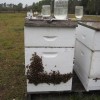Abstract
One of the many challenges beekeepers face is minimizing honey bee colony losses during winter. This can be especially challenging to beekeepers in extreme northerly climates. Special preparations must be made during the fall to ensure that colonies survive the winter months with minimal loss. This 3-page fact sheet was written by James D. Ellis and Katherine Hammons and published by the UF Department of Entomology and Nematology, September 2013.
References
Connor, D. M. and L. J. Connor. 2013. Honey Bee Biology and Beekeeping, Wicwas Press, Kalamazoo, MI. 360 pp.
Delaplane, K. S. 2006. Honey Bees and Beekeeping: A Year in the Life of an Apiary, 3rd Edition. The Georgia Center for Continuing Education, Athens, GA. 108pp.
University of Minnesota Bee Lab. http://beelab.umn.edu/ (6/5/2013)
Unless otherwise specified, articles published in the EDIS journal after January 1, 2024 are licensed under a Creative Commons Attribution-NonCommercial-NoDerivs 4.0 International (CC BY-NC-ND 4.0) license.

